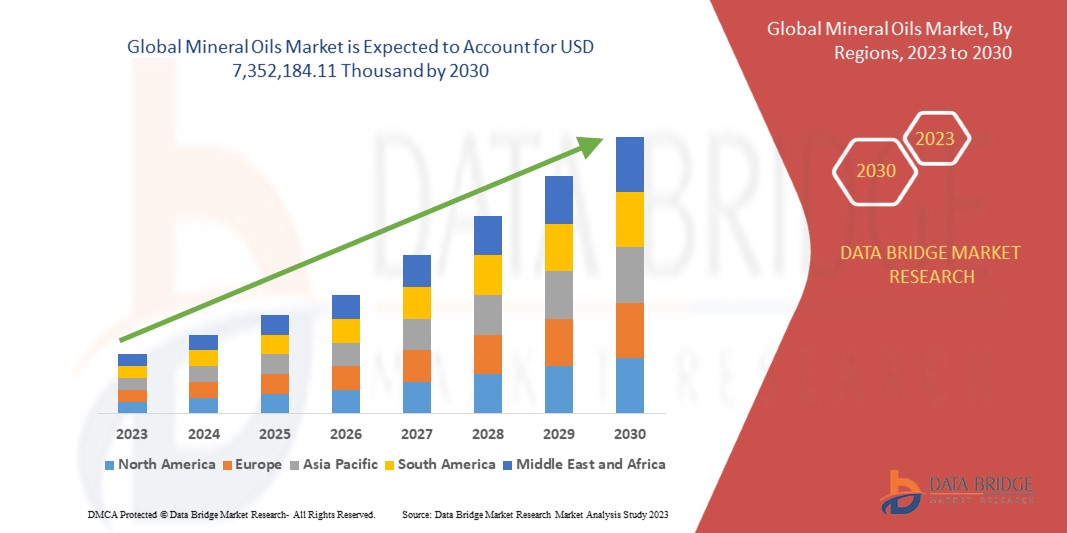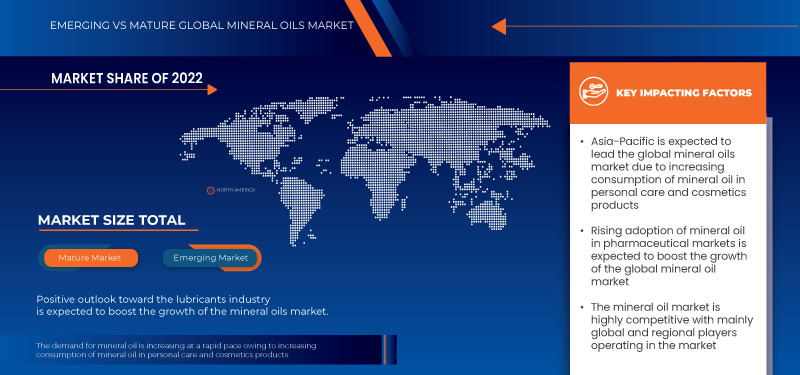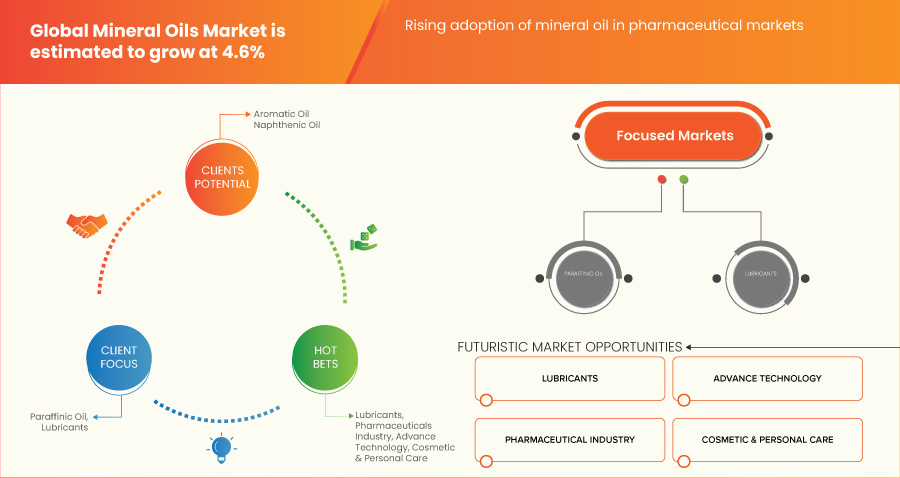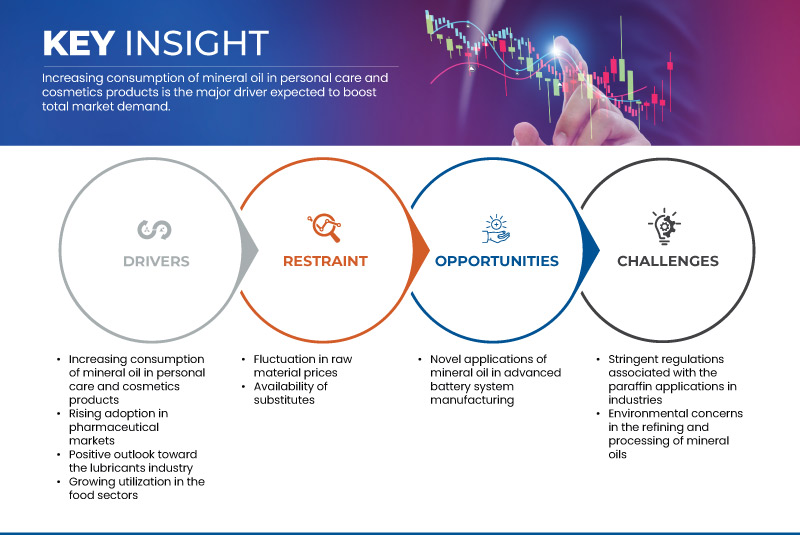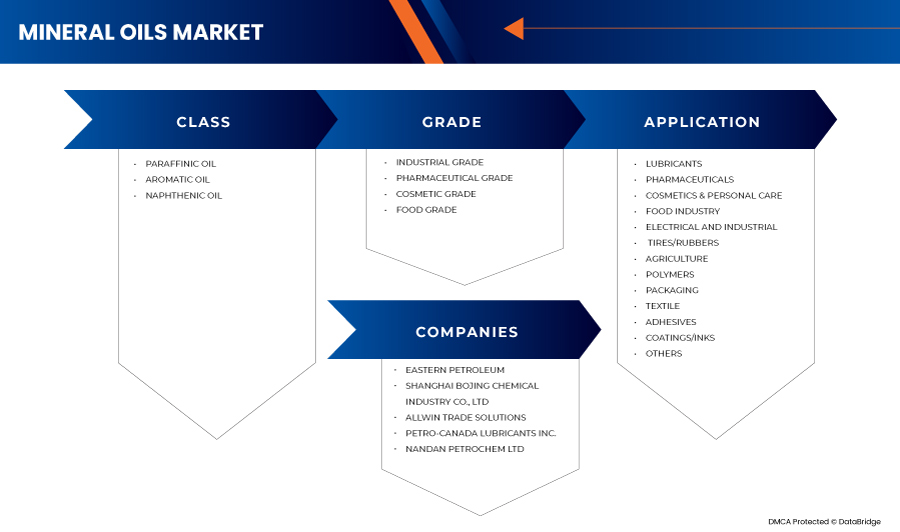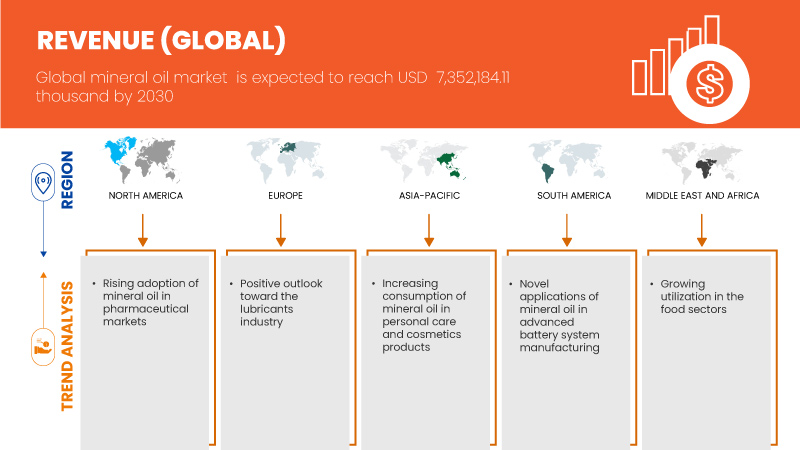Mineral Oils Market Analysis and Size
The mineral oils market is expected to grow significantly in the forecast period of 2023 to 2030. Data Bridge Market Research analyses that the market is growing with a CAGR of 4.6% in the forecast period of 2023 to 2030 and is expected to reach USD 7,352,184.11 thousand by 2030. The growing use of mineral oil in various industries has been the major driver for the global mineral oils market.
The mineral oils market report provides details of market share, new developments, and the impact of domestic and localized market players, analyses opportunities in terms of emerging revenue pockets, changes in market regulations, products approvals, strategic decisions, product launches, geographic expansions, and technological innovations in the market. To understand the analysis and the market scenario, contact us for an analyst brief. Our team will help you create a revenue-impact solution to achieve your desired goal.
|
Report Metric |
Details |
|
Forecast Period |
2023 to 2030 |
|
Base Year |
2022 |
|
Historic Years |
2021 (Customizable to 2015 - 2020) |
|
Quantitative Units |
Revenue in USD Thousand, Volumes in Tons |
|
Segments Covered |
Class (Paraffinic Oil, Aromatic Oil And Naphthenic Oil), By Grade (Industrial Grade, Pharmaceutical Grade, Cosmetic Grade And Food Grade), By Application (Lubricants, Pharmaceuticals, Cosmetics & Personal Care, Food Industry, Electrical And Industrial, Tires/Rubbers, Agriculture, Polymers, Packaging, Textile, Adhesives, Coatings/Inks, Others) |
|
Countries Covered |
U.S., Canada, Mexico, Austria, Belgium, France, Germany, Liechtenstein, Luxembourg, Monaco, Netherlands, Switzerland, Rest of Western Europe, Belarus, Bulgaria, Czech Republic, Hungary, Moldova, Poland, Romania, Russia, Slovakia, Ukraine, Rest of Eastern Europe, Denmark, Estonia, Finland, Latvia, Norway, Iceland, Sweden, United Kingdom and Rest of Northern Europe, Albania, Andora, Bosnia and Herzegovina, Croatia, Greece and Rest of Southern Europe, China, Japan, Australia, India, South Korea, Malaysia, Singapore, Indonesia, Thailand, Philippines, New Zealand, Vietnam, Taiwan rest of Asia-Pacific, Brazil, Argentina, rest of South America, South Africa, Kuwait, Oman, Saudi Arabia, Qatar, Saudi Arabia, U.A.E., Egypt, and rest of Middle East and Africa. |
|
Market Players Covered |
Shanghai Bojing Chemical Industry Co., Ltd, ALLWIN TRADE SOLUTIONS, Petro‐Canada Lubricants Inc., NANDAN PETROCHEM LTD, AP SAIGON PETRO, Gandhar Oil Refinery (India) Limited, Eni Benelux B.V., APAR Industries Limited, Exxon Mobil Corporation, Calumet Specialty Products Partners, L.P., LODHA Petro, RENKERT OIL, Cepsa, LANXESS, The International Group, Inc., CARMEL Industries, H&R GROUP, Indian Oil Corporation Ltd, Unicorn., Adinath Chemicals, savita.com, Repsol among others. |
Market Definition
Mineral oil is a chemical substance made from naturally occurring crude petroleum oil. Mineral oils are also known as baby oils, base oils, mineral base oils, or lubricant base oils. Mineral oils are transparent, colorless, oily liquids that are tasteless and odorless. They are insoluble in ethanol and water but soluble in petroleum ether, carbon disulfide, benzene, and volatile oils.
Global Mineral Oils Market Dynamics
This section deals with understanding the market drivers, opportunities, challenges, and restrains. All of this is discussed in detail below:
Drivers
- Emerging consumption of mineral oil in personal care and cosmetics products
Mineral oil is relatively cost-effective compared to some alternative ingredients used in personal care and cosmetics. This cost advantage makes it an attractive option for manufacturers looking to create affordable product lines or maintain competitive pricing.
White oil offers several advantages in personal care and cosmetics formulations. It is a versatile ingredient that can be easily incorporated into various product formulations, including creams, lotions, serums, and makeup products.
Mineral oil acts as a lubricant, improving the application of products on the skin. It also helps enhance the stability and shelf life of formulations, preventing ingredient separation and oxidation. The compatibility of mineral oil with a wide range of cosmetic ingredients makes it a popular choice for formulators. It does not clog pores, which further adds to its application in skincare products.
- Rising adoption in pharmaceutical markets
Mineral oil serves as an essential pharmaceutical additive, which refers to inactive ingredients used in the formulation of medications. It is commonly used as a lubricant, binder, emollient, and coating agent in various pharmaceutical products such as tablets, capsules, ointments, and creams. Its inert nature, stability, and compatibility with a wide range of active pharmaceutical ingredients (APIs) make it a preferred choice for formulations in the pharmaceutical industry. The increasing demand for pharmaceutical products, including over-the-counter drugs, prescription medications, and topical treatments, directly contributes to the demand for mineral oil.
Opportunity
- Novel application of mineral oil in advanced battery system manufacturing
The distinctive application of mineral oil in the production of advanced battery systems represents a huge opportunity for the mineral oils market.
Governments around the world are actively funding advanced battery systems, particularly for sectors such as electric vehicles (EVs). This focus is driven by the need to reduce carbon emissions, combat climate change, and transition to more sustainable forms of transportation.
Restraint
- Fluctuation in raw material prices
The primary raw material used in the production of mineral oil is petroleum, which is a naturally occurring hydrocarbon-based fossil fuel. Petroleum is extracted from underground reservoirs through drilling and then undergoes a refining process to obtain mineral oil. The prices of petroleum and its derivatives are subject to fluctuations due to factors such as global oil supply and demand dynamics, geopolitical tensions, natural disasters, and economic conditions. Fluctuations in raw material prices can significantly impact the production cost of mineral oil.
When the prices of petroleum and its derivatives increase, it can lead to higher production costs for mineral oil. It can directly impact the profit margins of mineral oil manufacturers and suppliers. When raw material prices rise, it becomes more expensive to produce mineral oil, potentially squeezing profit margins unless the increased costs can be passed on to customers through higher product prices.
Challenge
- Stringent regulations associated with paraffin applications in industries
The restrictions imposed on paraffin could have significant consequences on the global mineral oils market since it acts as one of the most dominating class in the global mineral oils market. This is because of its possible environmental and health effects. Paraffin, a component often found in mineral oils, has come under stringent regulations. Stricter restrictions on the use and management of paraffin in many industries are being implemented as regulatory authorities place a greater emphasis on sustainability and safety.
Recent Development
- According to Wiley, mineral oil has been shown to improve skin softness and barrier function better than some other emollients. Its introduction as a cosmetic oil was in the late 1800s, and still today, it is used as one of the main components of moisturizers, a true testament to its cost to efficacy window. Naturally, it has physical effects on the skin.
Global Mineral Oils Market Scope
The mineral oils market is categorized based on class, grade and applications. The growth amongst these segments will help you analyze major growth segments in the industries and provide the users with a valuable market overview and market insights to make strategic decisions to identify core market applications.
Class
- Paraffinic Oils
- Naphthenic Oils
- Aromatic Oils
On the basis of class, the mineral oils market is segmented into paraffinic oils, naphthenic oils, and aromatic oils.
Grade
- Food Grade
- Industrial Grade
- Cosmetic Grade
- Pharmaceutical Grade
- Others
On the basis of grade, the mineral oils market is segmented into food grade, industrial grade, cosmetic grade, pharmaceutical grade and others.
Application
- Lubricants
- Pharmaceuticals
- Cosmetics & Personal Care
- Food Industry
- Electrical And Industrial
- Tires/Rubbers
- Agriculture
- Polymers
- Packaging
- Textile
- Adhesives
- Coatings/Inks
- Others
On the basis of application, the mineral oils market is segmented into lubricants, pharmaceuticals, cosmetics & personal care, food industry, electrical and industrial, tires/rubbers, agriculture, polymers, packaging, textile, adhesives, coatings/inks, and others.
Global Mineral Oils Market Regional Analysis/Insights
The mineral oils market is segmented on the basis of class, grade and application.
The countries in the mineral oils market are the U.S., Canada, Mexico, Austria, Belgium, France, Germany, Liechtenstein, Luxembourg, Monaco, Netherlands, Switzerland, Rest of Western Europe, Belarus, Bulgaria, Czech Republic, Hungary, Moldova, Poland, Romania, Russia, Slovakia, Ukraine, Rest of Eastern Europe, Denmark, Estonia, Finland, Latvia, Norway, Iceland, Sweden, United Kingdom and Rest of Northern Europe, Albania, Andora, Bosnia and Herzegovina, Croatia, Greece and Rest of Southern Europe, China, Japan, Australia, India, South Korea, Malaysia, Singapore, Indonesia, Thailand, Philippines, New Zealand, Vietnam, Taiwan rest of Asia-Pacific, Brazil, Argentina, rest of South America, South Africa, Kuwait, Oman, Saudi Arabia, Qatar, Saudi Arabia, U.A.E., Egypt, and rest of Middle East and Africa.
Asia-Pacific is expected to dominate the global mineral oils market due to the increasing demand in the automotive industry. China is expected to dominate the Asia-Pacific mineral oils market due to the rising demand from various industries of mineral oil.
The country section of the report also provides individual market-impacting factors and changes in market regulation that impact the current and future trends of the market. Data point downstream and upstream value chain analysis, technical trends porter's five forces analysis, and case studies are some of the pointers used to forecast the market scenario for individual countries. Also, the presence and availability of global brands and their challenges faced due to large or scarce competition from local and domestic brands, the impact of domestic tariffs, and trade routes are considered while providing forecast analysis of the country data.
Competitive Landscape and Mineral Oils Market Share Analysis
The mineral oils market competitive landscape provides details by competitors. Details included are company overview, company financials, revenue generated, market potential, investment in research and development, new market initiatives, production sites and facilities, company strengths and weaknesses, product launch, product trials pipelines, product approvals, patents, product width and breadth, application dominance, technology lifeline curve. The above data points provided are only related to the companies’ focus related to the mineral oils market.
Some of the major market players operating in the market are Veolia, LyondellBasell Industries Holdings B.V., Indorama Ventures Public Company Limited., Dow, Repsol, Alpek S.A.B. de C.V., Far Eastern New Century Corporation, Borealis AG, PLASTIPAK HOLDINGS, INC., KW Plastics, Ultra-Poly Corporation, Jayplas, CUSTOM POLYMERS, Mineral oils UK, K K Asia (HK) Ltd., Envision Plastics, B & B Plastics Inc, Granite Peak Plastics, B. Schoenberg & Co., Inc., MBA Polymers Inc., Revolution Company among others. among others.
SKU-
Get online access to the report on the World's First Market Intelligence Cloud
- Interactive Data Analysis Dashboard
- Company Analysis Dashboard for high growth potential opportunities
- Research Analyst Access for customization & queries
- Competitor Analysis with Interactive dashboard
- Latest News, Updates & Trend analysis
- Harness the Power of Benchmark Analysis for Comprehensive Competitor Tracking
Table of Content
1 INTRODUCTION
1.1 OBJECTIVES OF THE STUDY
1.2 MARKET DEFINITION
1.3 OVERVIEW
1.4 LIMITATIONS
1.5 MARKETS COVERED
2 MARKET SEGMENTATION
2.1 MARKETS COVERED
2.2 GEOGRAPHICAL SCOPE
2.3 YEARS CONSIDERED FOR THE STUDY
2.4 CURRENCY AND PRICING
2.5 DBMR TRIPOD DATA VALIDATION MODEL
2.6 MULTIVARIATE MODELLING
2.7 MANUFACTURING PROCESS LIFELINE CURVE
2.8 PRIMARY INTERVIEWS WITH KEY OPINION LEADERS
2.9 DBMR MARKET POSITION GRID
2.1 MARKET APPLICATION COVERAGE GRID
2.11 SECONDARY SOURCES
2.12 ASSUMPTIONS
3 EXECUTIVE SUMMARY
4 PREMIUM INSIGHTS
4.1 PESTLE ANALYSIS
4.1.1 POLITICAL FACTORS
4.1.2 ECONOMIC FACTORS
4.1.3 SOCIAL FACTORS
4.1.4 TECHNOLOGICAL FACTORS
4.1.5 LEGAL FACTORS
4.1.6 ENVIRONMENTAL FACTORS
4.2 PORTER'S FIVE FORCES:
4.2.1 THE THREAT OF NEW ENTRANTS:
4.2.2 THE THREAT OF SUBSTITUTES:
4.2.3 CUSTOMER BARGAINING POWER:
4.2.4 SUPPLIER BARGAINING POWER:
4.2.5 INTERNAL COMPETITION (RIVALRY):
4.3 CLIMATE CHANGE SCENARIO
4.3.1 ENVIRONMENTAL CONCERNS
4.3.2 INDUSTRY RESPONSE
4.3.3 GOVERNMENT’S ROLE
4.3.4 ANALYST RECOMMENDATION
4.4 CONSUMER BUYING FACTORS ANALYSIS
4.4.1 APPLICATION AND INTENDED USE
4.4.2 BRAND REPUTATION
4.4.3 AVAILABILITY AND CONVENIENCE OF SHIPMENT
4.5 IMPORT-EXPORT SCENARIO
4.6 KEY INDICATIONS FOR PRICE LEVELS FOR EACH APPLICATION
4.6.1 INDUSTRIAL GRADE
4.6.2 PHARMACEUTICAL GRADE
4.6.3 COSMETIC GRADE
4.6.4 FOOD GRADE
4.7 PRICE INDEX
4.8 PRODUCTION CAPACITY OVERVIEW
4.9 PRODUCTION CONSUMPTION ANALYSIS - GLOBAL MINERAL OIL MARKET
4.1 RAW MATERIAL COVERAGE
4.11 SUPPLY CHAIN ANALYSIS
4.11.1 OVERVIEW
4.11.2 LOGISTIC COST SCENARIO
4.11.3 IMPORTANCE OF LOGISTICS SERVICE PROVIDERS
4.12 TECHNOLOGICAL ADVANCEMENTS
4.13 THREAT ANALYSIS WITH THE EXCLUSIVE COVERAGE ON THE POTENTIAL OF BIO-BASED MATERIAL-DERIVED COUNTERPARTS
4.14 VENDOR SELECTION CRITERIA
5 REGULATORY FRAMEWORK AND GUIDELINES
6 MARKET OVERVIEW
6.1 DRIVERS
6.1.1 INCREASING CONSUMPTION OF MINERAL OIL IN PERSONAL CARE AND COSMETICS PRODUCTS
6.1.2 RISING ADOPTION IN PHARMACEUTICAL MARKETS
6.1.3 POSITIVE OUTLOOK TOWARD THE LUBRICANTS INDUSTRY
6.1.4 GROWING UTILIZATION IN THE FOOD SECTORS
6.2 RESTRAINTS
6.2.1 FLUCTUATION IN RAW MATERIAL PRICES
6.2.2 AVAILABILITY OF SUBSTITUTES
6.3 OPPORTUNITIES
6.3.1 NOVEL APPLICATION OF MINERAL OIL IN ADVANCED BATTERY SYSTEM MANUFACTURING
6.4 CHALLENGES
6.4.1 STRINGENT REGULATIONS ASSOCIATED WITH THE PARAFFIN APPLICATIONS IN INDUSTRIES
6.4.2 ENVIRONMENTAL CONCERNS IN THE REFINING AND PROCESSING OF MINERAL OIL
7 GLOBAL MINERAL OIL MARKET: BY REGION
7.1 OVERVIEW
7.2 EUROPE
7.3 NORTH AMERICA
7.4 SOUTH AMERICA
7.5 ASIA-PACIFIC
7.6 MIDDLE EAST & AFRICA
8 GLOBAL MINERAL OIL MARKET: COMPANY LANDSCAPE
8.1 COMPANY SHARE ANALYSIS: GLOBAL
8.2 COMPANY SHARE ANALYSIS: NORTH AMERICA
8.3 COMPANY SHARE ANALYSIS: ASIA-PACIFIC
8.4 COMPANY SHARE ANALYSIS: EUROPE
8.5 NEW PACKAGING
8.6 PROCESS ADVANCEMENT
9 SWOT ANALYSIS
10 COMPANY PROFILES
10.1 REPSOL (2022)
10.1.1 COMPANY SNAPSHOT
10.1.2 REVENUE ANALYSIS
10.1.3 COMPANY SHARE ANALYSIS
10.1.4 PRODUCT PORTFOLIO
10.1.5 RECENT DEVELOPMENT
10.2 ENI BENELUX B.V. (SUBSIDIARY OF ENI S.P.A)
10.2.1 COMPANY SNAPSHOT
10.2.2 COMPANY SHARE ANALYSIS
10.2.3 PRODUCT PORTFOLIO
10.2.4 RECENT DEVELOPMENT
10.3 EXXON MOBIL CORPORATION (2022)
10.3.1 COMPANY SNAPSHOT
10.3.2 REVENUE ANALYSIS
10.3.3 COMPANY SHARE ANALYSIS
10.3.4 PRODUCT PORTFOLIO
10.3.5 RECENT DEVELOPMENT
10.4 H&R GROUP
10.4.1 COMPANY SNAPSHOT
10.4.2 REVENUE ANALYSIS
10.4.3 COMPANY SHARE ANALYSIS
10.4.4 PRODUCT PORTFOLIO
10.4.5 RECENT DEVELOPMENT
10.5 INDIAN OIL CORPORATION LTD (2022)
10.5.1 COMPANY SNAPSHOT
10.5.2 REVENUE ANALYSIS
10.5.3 COMPANY SHARE ANALYSIS
10.5.4 PRODUCT PORTFOLIO
10.5.5 RECENT DEVELOPMENT
10.6 ADINATH CHEMICALS
10.6.1 COMPANY SNAPSHOT
10.6.2 PRODUCT PORTFOLIO
10.6.3 RECENT DEVELOPMENT
10.7 ALLWIN TRADE SOLUTIONS
10.7.1 COMPANY SNAPSHOT
10.7.2 PRODUCT PORTFOLIO
10.7.3 RECENT DEVELOPMENT
10.8 AP SAIGON PETRO
10.8.1 COMPANY SNAPSHOT
10.8.2 PRODUCT PORTFOLIO
10.8.3 RECENT DEVELOPMENT
10.9 APAR INDUSTRIES LIMITED (2022)
10.9.1 COMPANY SNAPSHOT
10.9.2 REVENUE ANALYSIS
10.9.3 PRODUCT PORTFOLIO
10.9.4 RECENT DEVELOPMENT
10.1 CALUMET SPECIALTY PRODUCTS PARTNERS, L.P. (2022)
10.10.1 COMPANY SNAPSHOT
10.10.2 REVENUE ANALYSIS
10.10.3 PRODUCT PORTFOLIO
10.10.4 RECENT DEVELOPMENT
10.11 CARMEL INDUSTRIES
10.11.1 COMPANY SNAPSHOT
10.11.2 PRODUCT PORTFOLIO
10.11.3 RECENT DEVELOPMENT
10.12 CEPSA
10.12.1 COMPANY SNAPSHOT
10.12.2 PRODUCT PORTFOLIO
10.12.3 RECENT DEVELOPMENT
10.13 EASTERN PETROLEUM
10.13.1 COMPANY SNAPSHOT
10.13.2 PRODUCT PORTFOLIO
10.13.3 RECENT DEVELOPMENT
10.14 GANDHAR OIL REFINERY (INDIA) LIMITED (2022)
10.14.1 COMPANY SNAPSHOT
10.14.2 REVENUE ANALYSIS
10.14.3 PRODUCT PORTFOLIO
10.14.4 RECENT DEVELOPMENT
10.15 LANXESS (2022)
10.15.1 COMPANY SNAPSHOT
10.15.2 REVENUE ANALYSIS
10.15.3 PRODUCT PORTFOLIO
10.15.4 RECENT DEVELOPMENT
10.16 LODHA PETRO
10.16.1 COMPANY SNAPSHOT
10.16.2 PRODUCT PORTFOLIO
10.16.3 RECENT DEVELOPMENT
10.17 NANDAN PETROCHEM LTD
10.17.1 COMPANY SNAPSHOT
10.17.2 PRODUCT PORTFOLIO
10.17.3 RECENT DEVELOPMENT
10.18 PETRO‐CANADA LUBRICANTS INC.
10.18.1 COMPANY SNAPSHOT
10.18.2 PRODUCT PORTFOLIO
10.18.3 RECENT DEVELOPMENT
10.19 RENKERT OIL
10.19.1 COMPANY SNAPSHOT
10.19.2 PRODUCT PORTFOLIO
10.19.3 RECENT DEVELOPMENT
10.2 SAVITA
10.20.1 COMPANY SNAPSHOT
10.20.2 REVENUE ANALYSIS
10.20.3 PRODUCT PORTFOLIO
10.20.4 RECENT DEVELOPMENT
10.21 SHANGHAI BOJING CHEMICAL INDUSTRY CO., LTD
10.21.1 COMPANY SNAPSHOT
10.21.2 PRODUCT PORTFOLIO
10.21.3 RECENT DEVELOPMENT
10.22 THE INTERNATIONAL GROUP, INC.
10.22.1 COMPANY SNAPSHOT
10.22.2 PRODUCT PORTFOLIO
10.22.3 RECENT DEVELOPMENT
10.23 UNICORN
10.23.1 COMPANY SNAPSHOT
10.23.2 PRODUCT PORTFOLIO
10.23.3 RECENT DEVELOPMENT
11 QUESTIONNAIRE
12 RELATED REPORTS
List of Figure
FIGURE 1 GLOBAL MINERAL OIL MARKET: SEGMENTATION
FIGURE 2 GLOBAL MINERAL OIL MARKET: DATA TRIANGULATION
FIGURE 3 GLOBAL MINERAL OIL MARKET: DROC ANALYSIS
FIGURE 4 GLOBAL MINERAL OIL MARKET: REGIONAL VS COUNTRY MARKET ANALYSIS
FIGURE 5 GLOBAL MINERAL OIL MARKET: COMPANY RESEARCH ANALYSIS
FIGURE 6 GLOBAL MINERAL OIL MARKET: INTERVIEW DEMOGRAPHICS
FIGURE 7 GLOBAL MINERAL OIL MARKET: DBMR MARKET POSITION GRID
FIGURE 8 GLOBAL MINERAL OIL MARKET: MARKET APPLICATION COVERAGE GRID
FIGURE 9 GLOBAL MINERAL OIL MARKET: SEGMENTATION
FIGURE 10 ASIA-PACIFIC IS EXPECTED TO DOMINATE THE GLOBAL MINERAL OIL MARKET AND IS GROWING WITH THE HIGHEST CAGR IN THE FORECAST PERIOD OF 2023 TO 2030
FIGURE 11 RISING ADOPTION IN PHARMACEUTICAL MARKETS IS EXPECTED TO DRIVE THE GLOBAL MINERAL OIL MARKET IN THE FORECAST PERIOD FROM 2023 TO 2030
FIGURE 12 PARAFFINIC OIL SEGMENT IS EXPECTED TO ACCOUNT FOR THE LARGEST SHARE OF THE GLOBAL MINERAL OIL MARKET IN 2023 AND 2030
FIGURE 13 ASIA-PACIFIC IS THE FASTEST-GROWING MARKET FOR MINERAL OIL MANUFACTURERS IN THE FORECAST PERIOD OF 2023 TO 2030
FIGURE 14 VENDOR SELECTION CRITERIA
FIGURE 15 DRIVERS, RESTRAINTS, OPPORTUNITIES AND CHALLENGES OF THE GLOBAL MINERAL OIL MARKET
FIGURE 16 GLOBAL MINERAL OIL MARKET: SNAPSHOT (2022)
FIGURE 17 GLOBAL MINERAL OIL MARKET: BY REGION (2022)
FIGURE 18 GLOBAL MINERAL OIL MARKET: BY REGION (2023 & 2030)
FIGURE 19 GLOBAL MINERAL OIL MARKET: BY REGION (2022 & 2030)
FIGURE 20 GLOBAL MINERAL OIL MARKET: BY TYPE (2023 - 2030)
FIGURE 21 EUROPE MINERAL OIL MARKET: SNAPSHOT (2022)
FIGURE 22 EUROPE MINERAL OIL MARKET: BY COUNTRY (2022)
FIGURE 23 EUROPE MINERAL OIL MARKET: BY COUNTRY (2023 & 2030)
FIGURE 24 EUROPE MINERAL OIL MARKET: BY REGION (2022 & 2030)
FIGURE 25 EUROPE MINERAL OIL MARKET: BY TYPE (2023 - 2030)
FIGURE 26 NORTH AMERICA MINERAL OIL MARKET: SNAPSHOT (2022)
FIGURE 27 NORTH AMERICA MINERAL OIL MARKET: BY COUNTRY (2022)
FIGURE 28 NORTH AMERICA MINERAL OIL MARKET: BY COUNTRY (2023 & 2030)
FIGURE 29 NORTH AMERICA MINERAL OIL MARKET: BY COUNTRY (2022 & 2030)
FIGURE 30 NORTH AMERICA MINERAL OIL MARKET: BY TYPE (2023 - 2030)
FIGURE 31 SOUTH AMERICA MINERAL OIL MARKET: SNAPSHOT (2022)
FIGURE 32 SOUTH AMERICA MINERAL OIL MARKET: BY COUNTRY (2022)
FIGURE 33 SOUTH AMERICA MINERAL OIL MARKET: BY COUNTRY (2023 & 2030)
FIGURE 34 SOUTH AMERICA MINERAL OIL MARKET: BY COUNTRY (2022 & 2030)
FIGURE 35 SOUTH AMERICA MINERAL OIL MARKET: BY TYPE (2023 - 2030)
FIGURE 36 ASIA-PACIFIC MINERAL OIL MARKET: SNAPSHOT (2022)
FIGURE 37 ASIA-PACIFIC MINERAL OIL MARKET: BY COUNTRY (2022)
FIGURE 38 ASIA-PACIFIC MINERAL OIL MARKET: BY COUNTRY (2023 & 2030)
FIGURE 39 ASIA-PACIFIC MINERAL OIL MARKET: BY COUNTRY (2022 & 2030)
FIGURE 40 ASIA-PACIFIC MINERAL OIL MARKET: BY TYPE (2023 - 2030)
FIGURE 41 MIDDLE EAST & AFRICA MINERAL OIL MARKET: SNAPSHOT (2022)
FIGURE 42 MIDDLE EAST & AFRICA MINERAL OIL MARKET: BY COUNTRY (2022)
FIGURE 43 MIDDLE EAST & AFRICA MINERAL OIL MARKET: BY COUNTRY (2023 & 2030)
FIGURE 44 MIDDLE EAST & AFRICA MINERAL OIL MARKET: BY COUNTRY (2022 & 2030)
FIGURE 45 MIDDLE EAST & AFRICA MINERAL OIL MARKET: BY TYPE (2023 - 2030)
FIGURE 46 GLOBAL MINERAL OIL MARKET: COMPANY SHARE 2022 (%)
FIGURE 47 NORTH AMERICA MINERAL OIL MARKET: COMPANY SHARE 2022 (%)
FIGURE 48 ASIA-PACIFIC MINERAL OIL MARKET: COMPANY SHARE 2022 (%)
FIGURE 49 EUROPE MINERAL OIL MARKET: COMPANY SHARE 2022 (%)

Global Mineral Oil Market, Supply Chain Analysis and Ecosystem Framework
To support market growth and help clients navigate the impact of geopolitical shifts, DBMR has integrated in-depth supply chain analysis into its Global Mineral Oil Market research reports. This addition empowers clients to respond effectively to global changes affecting their industries. The supply chain analysis section includes detailed insights such as Global Mineral Oil Market consumption and production by country, price trend analysis, the impact of tariffs and geopolitical developments, and import and export trends by country and HSN code. It also highlights major suppliers with data on production capacity and company profiles, as well as key importers and exporters. In addition to research, DBMR offers specialized supply chain consulting services backed by over a decade of experience, providing solutions like supplier discovery, supplier risk assessment, price trend analysis, impact evaluation of inflation and trade route changes, and comprehensive market trend analysis.
Research Methodology
Data collection and base year analysis are done using data collection modules with large sample sizes. The stage includes obtaining market information or related data through various sources and strategies. It includes examining and planning all the data acquired from the past in advance. It likewise envelops the examination of information inconsistencies seen across different information sources. The market data is analysed and estimated using market statistical and coherent models. Also, market share analysis and key trend analysis are the major success factors in the market report. To know more, please request an analyst call or drop down your inquiry.
The key research methodology used by DBMR research team is data triangulation which involves data mining, analysis of the impact of data variables on the market and primary (industry expert) validation. Data models include Vendor Positioning Grid, Market Time Line Analysis, Market Overview and Guide, Company Positioning Grid, Patent Analysis, Pricing Analysis, Company Market Share Analysis, Standards of Measurement, Global versus Regional and Vendor Share Analysis. To know more about the research methodology, drop in an inquiry to speak to our industry experts.
Customization Available
Data Bridge Market Research is a leader in advanced formative research. We take pride in servicing our existing and new customers with data and analysis that match and suits their goal. The report can be customized to include price trend analysis of target brands understanding the market for additional countries (ask for the list of countries), clinical trial results data, literature review, refurbished market and product base analysis. Market analysis of target competitors can be analyzed from technology-based analysis to market portfolio strategies. We can add as many competitors that you require data about in the format and data style you are looking for. Our team of analysts can also provide you data in crude raw excel files pivot tables (Fact book) or can assist you in creating presentations from the data sets available in the report.

